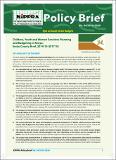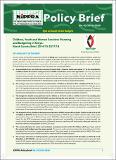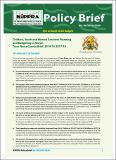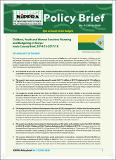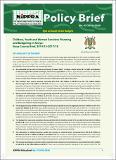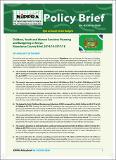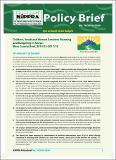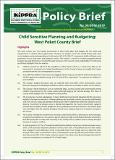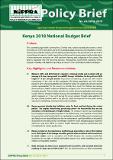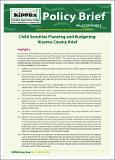Search
Now showing items 21-30 of 90
Policy Brief No. 64 of 2019-2020 on Children, Youth and Women Sensitive Planning and Budgeting in Kenya: Embu County Brief, 2014/15-2017/18
(The Kenya Institute for Public Policy Research and Analysis (KIPPRA), 2019)
This brief analysis the County Government of Embu plans and budgets for the needs of children, youth and women. The
analysis focused on social sector budgets and actual expenditures for the period 2014/15-2017/18, focusing ...
Policy Brief No. 62 of 2019-2020 on Children, Youth and Women Sensitive Planning and Budgeting in Kenya: Narok County Brief, 2014/15-2017/18
(The Kenya Institute for Public Policy Research and Analysis (KIPPRA), 2019)
This is a review on how the County Government of Narok plans and budgets to support the needs of children, youth and
women. The analysis focused on social sector budgets and actual expenditures for the period 2013/14-2017/18, ...
Policy Brief No. 80 of 2019-2020 on Children, Youth and Women Sensitive Planning and Budgeting: Trans Nzoia County Brief, 2014/15-2017/18
(The Kenya Institute for Public Policy Research and Analysis (KIPPRA), 2019)
This brief provides an analysis of how the County Government of Trans Nzoia plans and budgets for the needs of children,
youth and women. The analysis focused on social sector (health, education, water and sanitation, ...
Policy Brief No. 51 of 2019-2020 on Children, Youth and Women Sensitive Planning and Budgeting in Kenya: Isiolo County Brief, 2014/15-2017/18
(The Kenya Institute for Public Policy Research and Analysis (KIPPRA), 2019)
This brief provides an analysis on how the County Government of Isiolo plans and budgets for the needs of children, youth
and women. The analysis focused on social sector budgets and actual expenditures for the period ...
Policy Brief No. 47 of 2019-2020 on Children, Youth and Women Sensitive Planning and Budgeting in Kenya: Siaya County Brief, 2014/15-2017/18
(The Kenya Institute for Public Policy Research and Analysis (KIPPRA), 2019)
This brief provides an analysis on how the County Government of Siaya plans and budgets for the needs of children, youth
and women. The analysis focused on social sector budgets and actual expenditures for the period ...
Policy Brief No. 83 of 2019-2020 on Children, Youth and Women Sensitive Planning and Budgeting in Kenya: Nyandarua County Brief, 2014/15-2017/18
(The Kenya Institute for Public Policy Research and Analysis (KIPPRA), 2019)
This brief provides an analysis on how the County Government of Nyandarua plans and budgets for the needs of children,
youth and women. The analysis focused on social sector budgets and actual expenditures for the period ...
Policy Brief No. 78 of 2019-2020 on Children, Youth and Women Sensitive Planning and Budgeting in Kenya: Meru County Brief, 2014/15-2017/18
(The Kenya Institute for Public Policy Research and Analysis (KIPPRA), 2019)
This brief provides an analysis on how the County Government of Meru plans and budgets for the needs of children, youth
and women. The analysis utilized social sector budgets and actual expenditures for the period ...
Policy Brief No. 56 of 2018-2019 on Child Sensitive Planning and Budgeting: West Pokot County Brief
(The Kenya Institute for Public Policy Research and Analysis, 2018)
This brief review how the County Government of West Pokot plans and budgets for the needs and requirements of children (those aged below 18 years). The analysis covers the overall County and social sector budgets, and ...
Policy Brief No. 63 of 2018-2019 on Kenya 2018 National Budget Brief
(The Kenya Institute for Public Policy Research and Analysis (KIPPRA), 2018)
This national budget brief is among five (5) briefs which seek to identify the extent to which the needs of children are addressed by the national budget and social sector budgets in Kenya. The brief presents the macroeconomic ...
Policy Brief No. 57 of 2018-2019 on Child Sensitive Planning and Budgeting: Kisumu County Brief
(The Kenya Institute for Public Policy Research and Analysis (KIPPRA), 2018)
This planning and budgeting brief present a review of how the County Government of Kisumu plans and budgets for children needs and requirements. The analysis covers the overall County and social sector budgets, and actual ...

